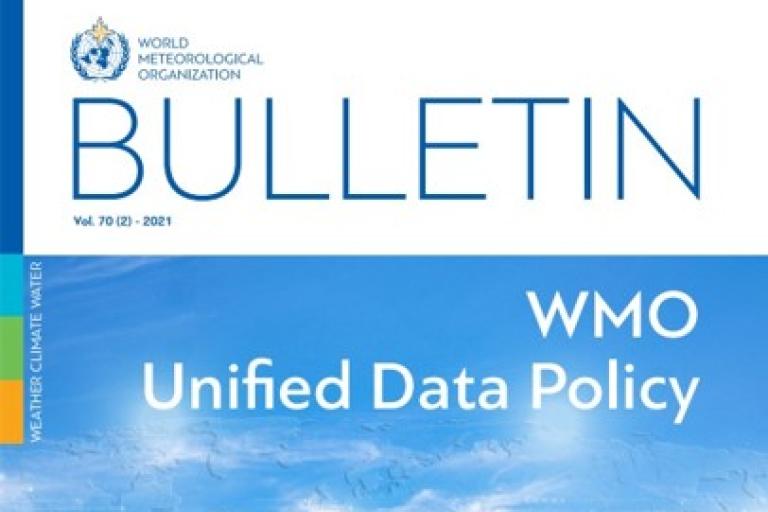WMO Bulletin dedicated to international data exchange

The new issue of the World Meteorological Organization’s Bulletin is dedicated entirely to international data exchange in Earth system monitoring and prediction and to the role of WMO data policy in establishing and maintaining this exchange.
Its publication is timed to support the consideration of the new Unified Data Policy by the Extraordinary World Meteorological Congress.
”Weather and climate are global in nature and all successful attempts to understand, monitor and predict them ultimately rely on international collaboration and the global exchange of observations and other data, » says WMO Secretary-General Prof. Petteri Taalas in a foreword.

WMO data policy has been instrumental to the success of weather prediction and to climate monitoring and prediction.
However, Resolution 40 (Congress-XI), arguably the most important of the WMO data policy resolutions, is now more than 25 years old and was drafted in a context far different from today’s: the relationship between the research and operational communities is even more critical to both sides, satellite data are far more important than ever before, and the private sector is playing a much more central role in all parts of the meteorological value chain than it did in 1995.
Likewise, Resolution 60 (Cg-17) predates the Paris Agreement of the United Nations Framework Convention on Climate Change (UNFCCC), and the need for exchange of climate-related data has grown immeasurably in importance since it was adopted.
« There is a clear need for WMO to update its data policy statements to ensure that its Members can continue to meet the ever growing demand for weather, climate and related environmental information and services, » says Prof. Taalas.
In keeping with its strategic focus on adopting an integrated Earth system approach to monitoring and prediction, WMO has chosen to update its policy statements under a single umbrella: the WMO Unified Data Policy, which encompasses data from all WMO-relevant Earth system discipline and domain areas. This will help WMO Members to improve their monitoring and prediction capabilities significantly and will help ensure that developing country WMO Members will reap the full benefits of the improved model products that will result from it.
WMO is putting forward three linked, strategic priority areas at the Extraordinary Session of the World Meteorological Congress in October 2021: The new Unified WMO Data Policy, the Global Basic Observing Network (GBON), aimed at securing the exchange of critically needed weather and climate observations, and the Systematic Observations Financing Facility (SOFF), which will provide technical and financial support for GBON where it is most needed.
Th Bulletin features the history of data exchange, the current status and plans for data exchange in all major domains and discipline areas and about opportunities. The technical, political and financial challenges that some Members are facing with their implementation of data exchange are also addressed.
It includes a two-part article dedicated to the particular issues of data exchange with and from developing country WMO Members. The first presents the views of four Permanent Representatives on the current situation and the expected impact of the three initiatives mentioned above from their developing country perspective. The second presents the experiences, lessons learned and perspectives on the future from a series of development and climate finance partners.
The Bulletin articles include:
- WMO Data Exchange – background, history and impact
- WMO Data Policy for the 21st Century
- WMO Data Initiatives and the Broader (UN) Data Agenda
- Modernizing Data Exchange for Earth System Monitoring and Prediction
- The Critical Role of Observations in Informing Climate Science, Assessment and Policy
- Hydrological Data Exchange
- Benefits of Atmospheric Composition Monitoring and International Data Exchange Policy
- The Global Ocean Observing System: Oceans of Data for Earth System Predictions
- The Furthest and Most Frigid Parts of the Globe
- Space Weather, Extending the Borders Beyond the Earth
- No Member left behind – Part 1: A developing country perspective on data exchange in meteorology
- No Member left behind – Part 2: Development partners’ perspectives on overcoming sustainability challenges in observing networks and data exchange - lessons learned










